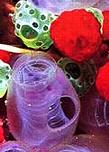
(larvacean) |

(solitary sea squirts) |
Phylum CHORDATA
(tree from Tree of Life;
|

(lancelet) |

(larvacean) |

(solitary sea squirts) |
Phylum CHORDATA
(tree from Tree of Life;
|

(lancelet) |
======= Cl. Larvacea (the appendicularians)
==1== UROCHORDATA =====|
| | === Cl. Thaliacea (salps, doliolids, pyrosomes)
| ==2=|
| === Cl. Ascidiacea (sea squirts)
<<=C==|
| ==4======================= CEPHALOCHORDATA (lancelets)
=3==|
| ====== Myxini (hagfish)
==5== VERTEBRATA ===|
====== other vertebrates (fish, amphibians, reptiles, birds, mammals)
Back to Zool 250 tree for animal phyla or Deuterostomia.
TRAITS SUPPORTING EACH CLADE (** plesiomorphic- a primitive state, not unique to clade):
|
b) cephalization c) notochord d) dorsal, somatic post-anal tail** e) dorsal hollow nerve cord f) pharynx with ciliated U-shaped gill slits** g) endostyle (thyroid gland in vertebrates) h) protocoelic nephridium (=axial complex) lost i) metacoel lost (i.e., coelom not tripartite) b) outer acellular tunic or temporary house c) 2 (Larvacea) or 1 (Ascidiacea) exhalent siphons or spiracles from pharynx d) U-shaped gut e) gill-slits no longer U-shaped f) primitive sperm morphology g) strict cell fate determination h) multiciliated cells |
b) differentiation of neural tube c) ciliated, U-shaped gill slits** b) unusual protonephridia-like nephridia b) full endoskeleton with cranium c) anterior end of neural tube enlarged as brain d) polar bodies from oral pole e) multiciliated cells |